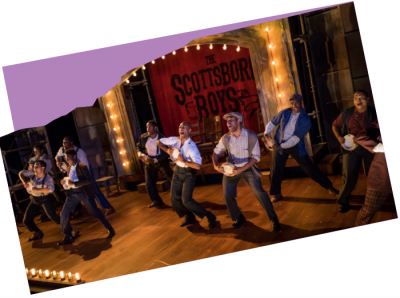Your donation sets the stage for a new season of Boston's most intimate, entertaining and provocative plays and musicals. Our shows make powerful connections with our audiences-- and they are only possible because of you.
appropriating some familiar classics
appropriating some familiar classics
In March, 2012, Time Out New York magazine published a list of the “30 Greatest American Family Dramas.” The list covered a range of works across the twentieth and early twenty-first centuries ranging in style and tone, from Arthur Miller’s gritty and unflinching Death of a Salesman to John Guare’s loopy and urban The House of Blue Leaves. However, as the editors pointed out in their introduction, “It’s worth noting that a significant number of the titles—and many in the top ten—are by dead white males from the previous century.”
 Enter Washington, DC native Branden Jacobs-Jenkins and his new play Appropriate, but he has more in mind than just offering up another realistic family drama to the tradition. Genre and form have long preoccupied Jacobs-Jenkins, and he uses them to find new ways of exploring—and exploding—themes of race, identity, and representation. His play Neighbors was a sharp and discomfiting satire about contemporary and historical black identity in the context of a “post-racial” America. The play rocked the New York theatre scene when it opened at The Public Theater in 2010 for its use of minstrel show characters and tropes—including black face. In Spring of 2014, Soho Rep premiered Jacobs-Jenkins’ “meta-melodrama” An Octoroon, which was a re-working of Irish playwright Dion Boucicalt’s 1859 melodrama, The Octoroon. The play, which featured Jacobs-Jenkins himself as a character, followed an interracial romance between a woman who is one-eighth black and a white slave owner.
Enter Washington, DC native Branden Jacobs-Jenkins and his new play Appropriate, but he has more in mind than just offering up another realistic family drama to the tradition. Genre and form have long preoccupied Jacobs-Jenkins, and he uses them to find new ways of exploring—and exploding—themes of race, identity, and representation. His play Neighbors was a sharp and discomfiting satire about contemporary and historical black identity in the context of a “post-racial” America. The play rocked the New York theatre scene when it opened at The Public Theater in 2010 for its use of minstrel show characters and tropes—including black face. In Spring of 2014, Soho Rep premiered Jacobs-Jenkins’ “meta-melodrama” An Octoroon, which was a re-working of Irish playwright Dion Boucicalt’s 1859 melodrama, The Octoroon. The play, which featured Jacobs-Jenkins himself as a character, followed an interracial romance between a woman who is one-eighth black and a white slave owner.
In Appropriate, the three Lafayette siblings, Toni, Bo, and Franz, along with their respective families and partners, converge on their family home—a deteriorating plantation house in southeastern Arkansas—to settle the accounts, both personal and financial, of their deceased father’s estate. Like their American Family Drama forbears, the Lafayette family has a history that is long, complicated, and full of secrets and recriminations.
 Jacobs-Jenkins has described Appropriate as a “Frankenstein” play of sorts—assembled from and inspired by iconic works from the American Family Dramatic tradition. To create his characters, he started with the types common to these stories: the “responsible” sibling who stays to guard the home, the sibling who leaves to create a new identity, as well as the Prodigal, the Bad Seed, the interloping stranger to this world, and the domineering Patriarch. You may recognize palimpsests of A Streetcar Named Desire’s Blanche DuBois in Toni, Mae and Gooper of Cat on a Hot Tin Roof in Rachael and Bo, and traces of Sam Shepard’s Shelly from Buried Child in River. Other works that Jacobs-Jenkins has read and internalized include Tennessee Williams’ The Glass Menagerie, Sam Shepard’s Curse of the Starving Class, Arthur Miller’s Death of a Salesman and All My Sons, Horton Foote’s Dividing the Estate, and Eugene O’Neill’s Long Day’s Journey into Night. These classic family dramas address themes of loss, inheritance, intimacy, and legacy, all of which are core to the struggles of the Lafayette family.
Jacobs-Jenkins has described Appropriate as a “Frankenstein” play of sorts—assembled from and inspired by iconic works from the American Family Dramatic tradition. To create his characters, he started with the types common to these stories: the “responsible” sibling who stays to guard the home, the sibling who leaves to create a new identity, as well as the Prodigal, the Bad Seed, the interloping stranger to this world, and the domineering Patriarch. You may recognize palimpsests of A Streetcar Named Desire’s Blanche DuBois in Toni, Mae and Gooper of Cat on a Hot Tin Roof in Rachael and Bo, and traces of Sam Shepard’s Shelly from Buried Child in River. Other works that Jacobs-Jenkins has read and internalized include Tennessee Williams’ The Glass Menagerie, Sam Shepard’s Curse of the Starving Class, Arthur Miller’s Death of a Salesman and All My Sons, Horton Foote’s Dividing the Estate, and Eugene O’Neill’s Long Day’s Journey into Night. These classic family dramas address themes of loss, inheritance, intimacy, and legacy, all of which are core to the struggles of the Lafayette family.
 And yet what does it mean that Jacobs-Jenkins —whose work up until now has mainly addressed issues of blackness — has written a play solely consisting of white characters, inspired by plays written by white American men? This question relates directly to the title he has chosen. Throughout the play the Lafayettes hotly debate what is “appropriate,” particularly in front of and related to children. And although plenty of “inappropriate” behavior occurs in the play, another reading of the word is as one of its verb meanings: “to take or make use of without authority or right.” Questions of authorship, ownership, representation, who has the right to tell certain stories, and who is expected to tell certain stories emerge.
And yet what does it mean that Jacobs-Jenkins —whose work up until now has mainly addressed issues of blackness — has written a play solely consisting of white characters, inspired by plays written by white American men? This question relates directly to the title he has chosen. Throughout the play the Lafayettes hotly debate what is “appropriate,” particularly in front of and related to children. And although plenty of “inappropriate” behavior occurs in the play, another reading of the word is as one of its verb meanings: “to take or make use of without authority or right.” Questions of authorship, ownership, representation, who has the right to tell certain stories, and who is expected to tell certain stories emerge.
Is the story of Appropriate less legitimate because it was not written by a white writer who grew up on a southern plantation? Are the Lafayettes any less believable because they don’t overtly resemble their author? It is safe to say that Jacobs-Jenkins, who is inspired by a wide variety of cultures, sources, and styles, will continue to question these assumptions and push these boundaries. As audience members, will we as well?
Originally published in November 2013 in the program book for the Woolly Mammoth Theatre Company production of Appropriate.
 Join us for spectacular season 33!
Join us for spectacular season 33! Past Productions
Past Productions a strange loop
a strange loop




